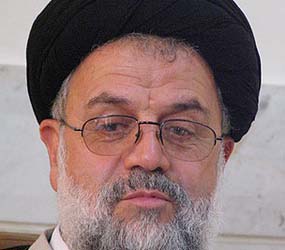Tuesday, August 24, 2010
|
Home
>
Radio Zamaneh in English
>
Latest News
>
Iranian cleric claims leadership of clergy open to referendum
|
Iranian cleric claims leadership of clergy open to referendum

Ayatollah Mousavi Tabrizi
Ayatollah Mousavi Tabrizi, secretary-general of Qom Researchers and Seminary Teachers declared that the issue of leadership of a senior cleric referred to as “Velayat Faghih” in Islamic Republic constitution can be very well put to a referendum and even the late leader of the 1979 Revolution, Ayatollah Khomeini would have agreed with such a referendum.
He stressed that Islam cannot be established on dictatorship and it has to be based on the will of the people.
Ayatollah Mousavi Tabrizi told Iran’s labour news agency, ILNA that although in theological terms, the late founder of the Islamic Republic, Ayatollah Khomeini, believed in “Velayat Faghih”, from a political standpoint he believed that it must be the choice of the people.
He added: “If the Imam were alive today and some people were to tell him that due to post-Revolution generational developments in society, the majority are probably no longer in favour of “Velayat Faghih” and we want to gauge the support of people at this time, the Imam would have agreed with a referendum.”
Earlier Mehdi Karroubi, disputing candidate of the June presidential elections, had proposed carrying out such a referendum.
Ayatollah Mousavi, who has supported election protesters in the past ten months, also added that everyone must refrain from accusing those who propose such a referendum of treason.
According to the Islamic Republic constitution, the supreme leadership of the country belongs to an expert member of the clergy who is the chief interpreter of God’s will in different contexts. Since the establishment of the Islamic Republic, Ayatollah Khomeini was the first Supreme Leader of the Islamic Republic and after his death, Ayatollah Khamenei took on the position.
Islamic Republic hardliners do not stand for any questioning of the “Velayat Faghih” and the disagreements on this issue is at the root of the divisions within the Islamic Republic establishment.
|
|

